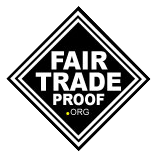
Fondo Paez – Cafe Naftewesh Located in the remote, highland regions of Cauca, the Paez (who also call themselves Nasa, or “the people”) is the largest indigenous group in Colombia. Fondo Paez was founded in 1992, with the primary goal of recuperating traditional agricultural knowledge and indigenous culture which had been buried by centuries of conflict and oppression.
The main cash crop of this region is still coffee. Therefore, to ensure a stable income for their members, Fondo Paez proposed a cooperative of community based coffee farmer associations. By 2000, they were sufficiently self-organized to be selling coffee through the Coffee Federation’s Specialty Coffee program. Today they are active members of the fair trade community and process, market, and export their coffee via the regional plant at ExpoCosurca, but maintain full independence in their internal decision-making process. They are governed democratically with final decision-making powers at the general assembly of member delegates, and the day to day work distributed between the producer board of directors and production, organizational, internal credit and external marketing committees run by the members themselves.
Quality control is an art unto itself within Fondo Paez. Prior to their harvest, running from early June through late August in the majority of their growing regions, Fondo Paez promoters visit each member to review production results and to encourage best picking, handling and wet processing practices. Their efforts to date have definitely paid off.
Fondo Paez coffee is characterized by pungent flavors of raisin, apricot and fresh berries, honeysuckle and vanilla aromas, bright acidity and silky full body; and their coffee continues to win recognition and awards as a 90+ coffee in both local and international cupping competitions.
But that is not to say that the path is clear for Fondo Paez farmers. Climate change increasingly wreaks havoc on their harvests, with unseasonable rains, heat waves and, as in so much of Latin America, severe leaf rust, also known as the dreaded roya. Fondo Paez suffered the brunt of this infestation some four years ago. But their members are only now coming back with full production levels. In the meantime, these have been challenging years. Many families have depended upon other crops and products such as corn, potatoes, beans, a variety of root vegetables, cows’ milk and cheese, and the manufacturing of panela; a bi-product of sugar cane to complement what little coffee sales they had, while working their field renovations towards full coffee production recovery. We began importing from Fondo Paez in 2004. Since then, we have purchased more than 2 million pounds of their fine coffee and have followed their development closely – both with site visits and regular communication, as well as offering roaster and staff support as they worked through a very tough time with their production and field renovation.
We are inspired to see the extent to which Fondo Paez has created a sustainable vision for their indigenous communities. This is remarkable in and of itself, but the work and successes of this organization are truly extraordinary when viewed within the context of Colombian politics and globalization. From Spanish conquest centuries ago to the armed conflict raging in their territory for the past 40 years, the Paez people continue to struggle for their lives and livelihoods, their land, and their rights to self-determination.
Asociacion Kwe'sx Uma Kiwe Peykajn Mjinxisa Fondo Paez
- FLO ID#: 3276
- Organic Cert
Profile
- Total Bags Purchased: 20273
- Partner Since: 2004
- Founded: 1992
- Total Members: 243
- Total Hectares: 253.29
- Organic Members: 207
- Female Members: 57
- Avg Farm Size: 1.04 ha
- Organic Hectares: 183.46
- Harvest: Mar-Nov
- Elevation: 1500-2350 m
Varietals Grown:
- 40% Colombia
- 30% Castillo
- 25% Typica
- 5% Bourbon
Social Premium Investment: 2024 Crop Year
Fair Trade Certification guarantees 20 cents/lb of the price paid a producer organization is set aside as a social premium. How this money is invested is a decision taken collectively by the general assembly of members at the end of each harvest. Below is a break down of how producers in this organization chose to spend their fair trade premium.
| 61% |
Community Development
|
| 39% |
Improve Yields
|
